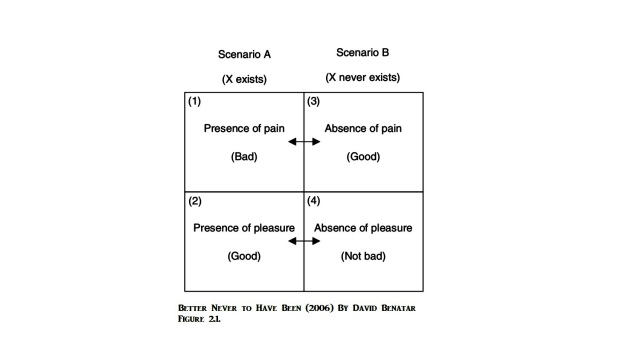“Pain is hated much more now than formerly; one speaks much worse of it; indeed, one can hardly endure the presence of pain as a thought and makes it a matter of conscience and a reproach against the whole of existence.” – Friedrich Nietzsche
Professor David Benatar claims that ‘the presence of pain is bad’. So if you gradually begin to experience back pain because you are seated in an uncomfortable position, you ought to interpret this as being bad. Really!? Surely such pain can be seen as a good because it reminds one to change or adopt a more suitable posture. Furthermore, athletes experience all sorts of pain while training and suffer all kinds of injury along the way. Without such ordeals they would be unable to excel. Pain can be a great motivator for all sorts of objectives. It’s not necessarily bad.
—
So if pain is not on all occasions a bad per se, and can in fact be good for various purposes, where in particular does the logic fall short in Benatar’s statement. Well, whenever we use the word ‘is’ to say what something is, there’s a potential cognitive dissonance that comes into play. For example, if we say that Sally ‘is’ physically strong, we are inferring that she possesses an attribute of strength. This premise doesn’t stick should we find her half dead in a hospital bed.
—
One might argue that she used to be strong and provide evidence to confirm this proposition. But that doesn’t do diddly-squat in the here and now. Sally clearly remains weakened regardless of her past experiences. Either she is strong or she is not. No amount of rationalizing can undo this contradiction in terms. David on the other hand believes that it ‘is uncontroversial to say that the presence of pain is bad’ when in reality there are all sorts of examples that can blatantly contradict his presupposition.
—
We are entering a tricky structure if we go any further with his line of reasoning but we can use our independent-will and imagination to at least try to repair and strengthen his wobbly edifice for the sake of a thought experiment, which may in truth be what he intends for us to do anyhow. Now with that in mind, if we were to say that pain can be both bad and good in some relative sense, then we are getting the ball rolling. Can we add more dynamism to this project; of course, we are also free to think beyond the strictures of good and evil; bodily benefit and harm.
—
Therefore we can also posit the idea that pain and pleasure are neither good nor bad. In truth, we may arrive at Benatar’s conclusion via another route. What if we were to add that the good can be nothing other than what ‘remains’ beneficial? Let’s run extra hard to get this kite flying shall we! So this would mean that nothing that gives us pleasure or pain can augment or deplete the good. Hold on, says the cynical voice in our heads, you are trespassing on metaphysical grounds! No we are not, says rationality, we have yet to take a single step away from our intellect.
—
Very well then, at least give us an example of this so called other good. With pleasure, he-he, when we participate in intellectual activities, such as active reading or meditation practice, we improve our capacity to concentrate, focus, and sustain our attention. In turn these dispositions of the mind and/or intellect allow us to think more clearly, enabling us to discern and make better decisions.
—
Unless you are bent on finding fault, even criticism itself has to admit that there’s nothing wrong with optimal performance or exercising the intelligence to locate an appropriate response. Is there any who would like to refute me here by taking the opposite point of view: that improving upon our intellectual capacities—such as concentration—goes contrary to our good? So if pleasure and pain don’t detract from our true good – excellence of mind – what does? Rage, sloth, immoderation, greed and so forth; basically all that can be categorized as extremes; namely, vice.


